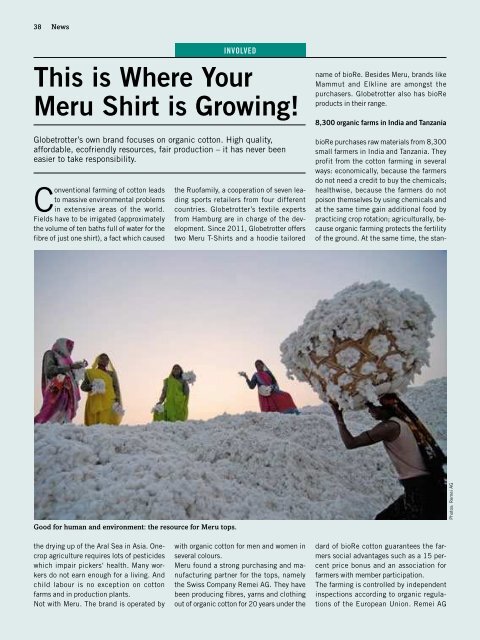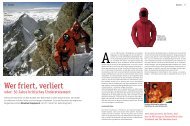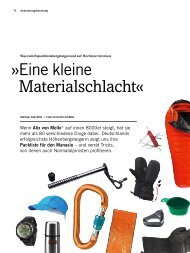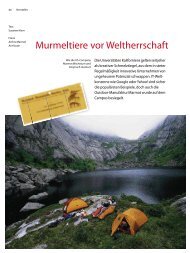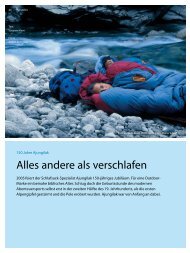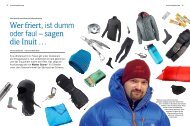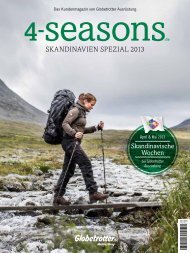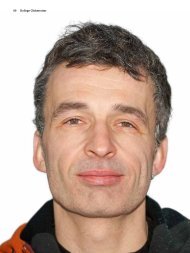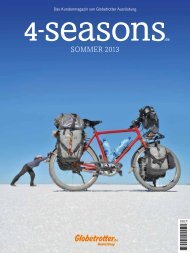autumn 2012 - 4-Seasons.de
autumn 2012 - 4-Seasons.de
autumn 2012 - 4-Seasons.de
You also want an ePaper? Increase the reach of your titles
YUMPU automatically turns print PDFs into web optimized ePapers that Google loves.
38 News News 39<br />
InVolVeD<br />
This is Where Your<br />
Meru Shirt is Growing!<br />
Globetrotter’s own brand focuses on organic cotton. High quality,<br />
affordable, ecofriendly resources, fair production – it has never been<br />
easier to take responsibility.<br />
Conventional farming of cotton leads<br />
to massive environmental problems<br />
in extensive areas of the world.<br />
Fields have to be irrigated (approximately<br />
the volume of ten baths full of water for the<br />
fibre of just one shirt), a fact which caused<br />
Good for human and environment: the resource for Meru tops.<br />
the drying up of the Aral Sea in Asia. Onecrop<br />
agriculture requires lots of pestici<strong>de</strong>s<br />
which impair pickers‘ health. Many workers<br />
do not earn enough for a living. And<br />
child labour is no exception on cotton<br />
farms and in production plants.<br />
Not with Meru. The brand is operated by<br />
the Ruofamily, a cooperation of seven leading<br />
sports retailers from four different<br />
countries. Globetrotter’s textile experts<br />
from Hamburg are in charge of the <strong>de</strong>velopment.<br />
Since 2011, Globetrotter offers<br />
two Meru T-Shirts and a hoodie tailored<br />
with organic cotton for men and women in<br />
several colours.<br />
Meru found a strong purchasing and manufacturing<br />
partner for the tops, namely<br />
the Swiss Company Remei AG. They have<br />
been producing fibres, yarns and clothing<br />
out of organic cotton for 20 years un<strong>de</strong>r the<br />
name of bioRe. Besi<strong>de</strong>s Meru, brands like<br />
Mammut and Elkline are amongst the<br />
purchasers. Globetrotter also has bioRe<br />
products in their range.<br />
8,300 organic farms in India and Tanzania<br />
bioRe purchases raw materials from 8,300<br />
small farmers in India and Tanzania. They<br />
profit from the cotton farming in several<br />
ways: economically, because the farmers<br />
do not need a credit to buy the chemicals;<br />
healthwise, because the farmers do not<br />
poison themselves by using chemicals and<br />
at the same time gain additional food by<br />
practicing crop rotation; agriculturally, because<br />
organic farming protects the fertility<br />
of the ground. At the same time, the stan-<br />
dard of bioRe cotton guarantees the farmers<br />
social advantages such as a 15 percent<br />
price bonus and an association for<br />
farmers with member participation.<br />
The farming is controlled by in<strong>de</strong>pen<strong>de</strong>nt<br />
inspections according to organic regulations<br />
of the European Union. Remei AG<br />
Photos: Remei AG<br />
The plantation is in line with the organic<br />
farming regulations of the European<br />
Union.<br />
also compensates for its CO 2 footprint in<br />
India and Tanzania: It is co-financing<br />
3,150 organic gas cooking facilities and<br />
4,200 smoke-free kitchen stoves, thus enhancing<br />
air quality and protecting forests.<br />
Moreover, each cooking facility saves enough<br />
CO 2 annually to produce and transport<br />
500 T-Shirts.<br />
Globetrotter on site<br />
There are strict rules governing processing<br />
such as no child labour, safety at the working<br />
place and appropriate renumeration.<br />
An in<strong>de</strong>pen<strong>de</strong>nt testing institute monitors<br />
compliance. So, Remei gets most of their<br />
production line certified according to<br />
SA8000, an international standard to improve<br />
working conditions. In addition, the<br />
bioRe foundation runs social projects in<br />
India and Tanzania which to date boast 20<br />
town schools and a mobile medical practice.<br />
In November 2010, Globetrotter<br />
colleague Christina Holst from the textile<br />
<strong>de</strong>partment inspected bioRe projects in India.<br />
»I was impressed how much they put<br />
their heart into those projects«, says the<br />
Meru product <strong>de</strong>veloper. It is a fight<br />
against genetically modified cotton: »It<br />
brings in a higher income in the short run«,<br />
explains Christina Holst. »However, many<br />
farmers run into <strong>de</strong>bts because of the ex-<br />
InVolVeD<br />
Available at Globetrotter: Meru’s Tawa<br />
Hoo<strong>de</strong>d Jacket ma<strong>de</strong> of bioRe cotton.<br />
pensive, annual, genetically modified<br />
seeds and the artificial fertilizer. In the<br />
long run, organic cotton is the better<br />
choice for farmers.«<br />
Meru <strong>de</strong>volepers know what they are doing<br />
when they entrust the production of<br />
the tops to Remei AG. From now on, customers<br />
can also track back their clothes<br />
on the website (remei.ch/produkte-traceability/),<br />
right up to the farming area.<br />
Globe trotter salespeople lead by example:<br />
The orange and black T-Shirts are<br />
ma<strong>de</strong> of bioRe cotton.<br />
<<br />
Vital momentum<br />
Six new electric bicycles help<br />
Globetrotter employees to get from<br />
A to B – giving momentum to CO ²<br />
reduction.<br />
It is exactly 4.1 kilometres from »BKS«<br />
to »NHB«, Globetrotter employees say,<br />
meaning the distance between the headquarter<br />
at Hamburg’s Bargkoppelstieg<br />
and the logistics centre at Neue Höltigbaum.<br />
This road and many others can<br />
Bernd Repenning (right) from E-Collection<br />
han<strong>de</strong>d the bikes over to Fabian<br />
Nednza.<br />
now be cycled with six E-Bikes instead of<br />
travelling in cars. In June, Globetrotter<br />
put the electric bicycles ma<strong>de</strong> by Hamburg-based<br />
E-Collection into service.<br />
They are pe<strong>de</strong>lecs, so Globis still have to<br />
pedal but with the help of a 250-watt<br />
motor acting pretty much like a permanent<br />
tail wind.<br />
Fabian Nedza is Globetrotter Representative<br />
for »Corporate Social Responsibility«<br />
and explains: »After introducing a CO rule ²<br />
for company cars two years ago, as well as<br />
the use of the electric Merce<strong>de</strong>s Vito for<br />
our internal transport of products since<br />
2011, with the E-Bikes we have taken<br />
another step towards the reduction of CO - ²<br />
emissions caused by mobility.«<br />
The E-Bikes speed along at 25 km/h over a<br />
distance of up to 80 kilometres. Enough to<br />
go to appointments in the city, such as at<br />
»JFS« - or how do they call the Jungfernsteig<br />
at Globetrotter?<br />
<<br />
Photo: Globetrotter Ausrüstung


